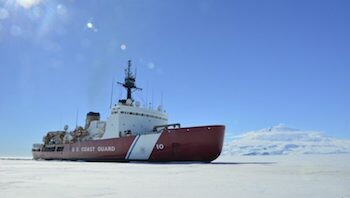As the ice at the top of the world melts, the Russians are trying to put themselves in position to control a new shipping route in the northern waters of the world. They say they have the right to collect escort tariffs and hope to freeze out the U.S., China and other countries with hopes of controlling global shipping routes never before available.
The U.S. has other ideas. It’s about time we catch up with the rest of the world when it comes to building new icebreakers to service the North and South poles. And that’s exactly what the U.S. is doing.
The Coast Guard is recapitalizing its polar icebreaker fleet to ensure continued access to both polar regions and support the nation’s economic, commercial, maritime and national security needs. The plan is to build three heavy and three medium icebreakers.
Toward that end, VT Halter Marine, Pascagoula, Miss., was awarded a contract for the detail, design and construction of the lead Polar Security Cutter (PSC). Construction on the first PSC is planned to begin this year with contract delivery planned for 2024. (Delivery may be moved up to 2023.)The contract includes financial incentives for earlier delivery.
The first 460'×88' PSC is progressing through the detailed design phase, and VT Halter is actively preparing for its construction, shipyard officials said.
In July 2021, Halter Marine was scheduled to complete upgrades to the launch way area where the PSC will be built. The new icebreaker is the heaviest vessel per foot of length that Halter Marine has constructed at its Pascagoula shipyard. The launch way has been fortified to accommodate the PSC’s 19,000-ton launch weight.
The cutter is designed to break through ice of 6'6", independently break through a pressure ridge 21' thick, and be able to operate for 80 days without replenishment.
Meanwhile, the medium icebreaker should be able to break ice not less than 4'6" thick at 3 knots and operate for 80 days without replenishment. Both icebreakers will be capable of surface defense using removable weapons and will be able to be fitted with additional sensors and weapons.
We’re back in the game, and it’s about time.




